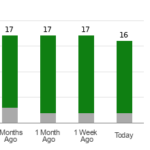
Apple Inc. AAPL researchers have delved into artificial intelligence (AI), unveiling new techniques for training large language models (LLMs) in their quest for more powerful and flexible AI systems.
The Latest Breakthrough: Apple’s researchers quietly released a research paper titled “MM1: Methods, Analysis & Insights from Multimodal LLM Pre-training” on arxiv.org, showcasing innovative methods for integrating text and images in AI training. The study suggests that combining diverse data and model architectures could significantly boost AI system performance across various benchmarks.
The research found that a mix of visual and linguistic information in the dataset was essential for the MM1 models to excel in tasks like image captioning, visual question answering, and natural language inference.
An intriguing find was the impact of image resolution on the output quality of the AI model—a clear correlation emerged between higher image resolution and enhanced data quality.
Apple’s increased focus on AI investments parallels the efforts of tech giants like Alphabet Inc.’s Google, Microsoft Corp., and Amazon.com Inc., as they integrate generative AI capabilities into their products.
The company’s reported annual expenditure of $1 billion on AI development underscores its commitment to staying competitive in the AI landscape.
Nevertheless, Apple’s potential partnership with Google to license its Gemini model for iPhone generative AI features adds an interesting twist to its AI strategy.
The Significance: Apple’s recent advancements in AI align with its broader aim of enhancing AI capabilities, evident in the company’s strategic acquisitions of AI startups.
CEO Tim Cook’s heightened focus on AI during the December quarter earnings call, as pointed out by Wedbush’s Dan Ives, signals a new growth cycle for Apple with AI and iPhone emerging as primary growth drivers.
The incorporation of generative AI technology into iPhones is part of Apple’s larger strategy to enhance device capabilities and foster innovation in the tech industry.
Apple’s recent hardware innovations like the M3 Max processor for MacBooks and the S9 chip in Apple Watch underscore its AI aspirations.
The neural engine in the iPhone 15 Pro’s A17 Pro chip accelerates AI processes, while running LLMs on-device using Flash memory enables faster offline data processing.
Stock Performance: Apple’s stock closed at $172.63 on Friday, indicating a marginal 0.01% increase, according to Benzinga Pro.
Delve into more of Benzinga’s Consumer Tech coverage by following this link.
Explore: Nvidia CEO Jensen Huang’s perspective on the pricing of AI chips compared to its GPUs.
Disclaimer: This content was created with the assistance of Benzinga Neuro and was reviewed and published by Benzinga editors.
Photo via Shutterstock






